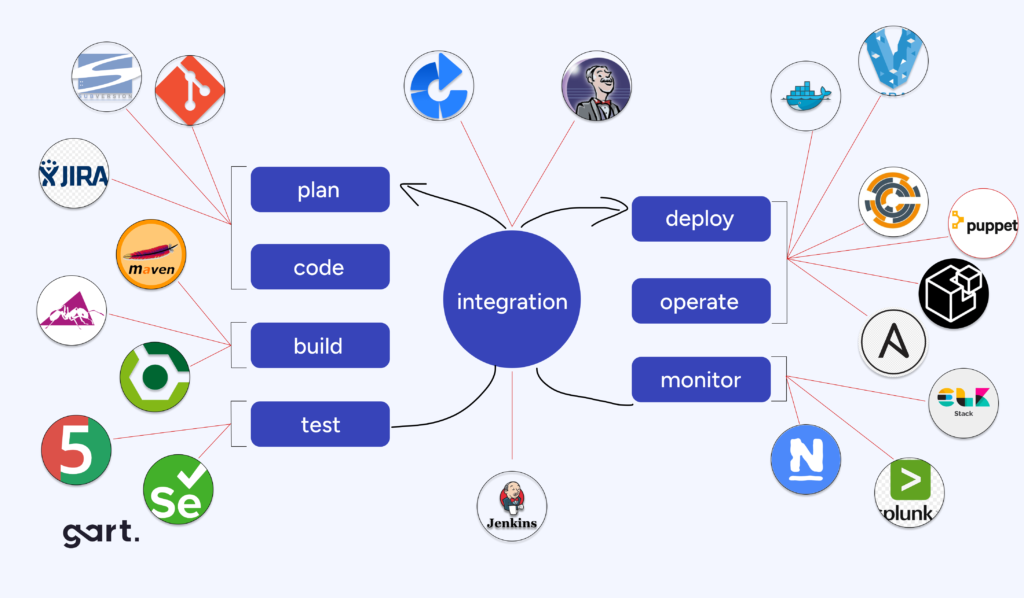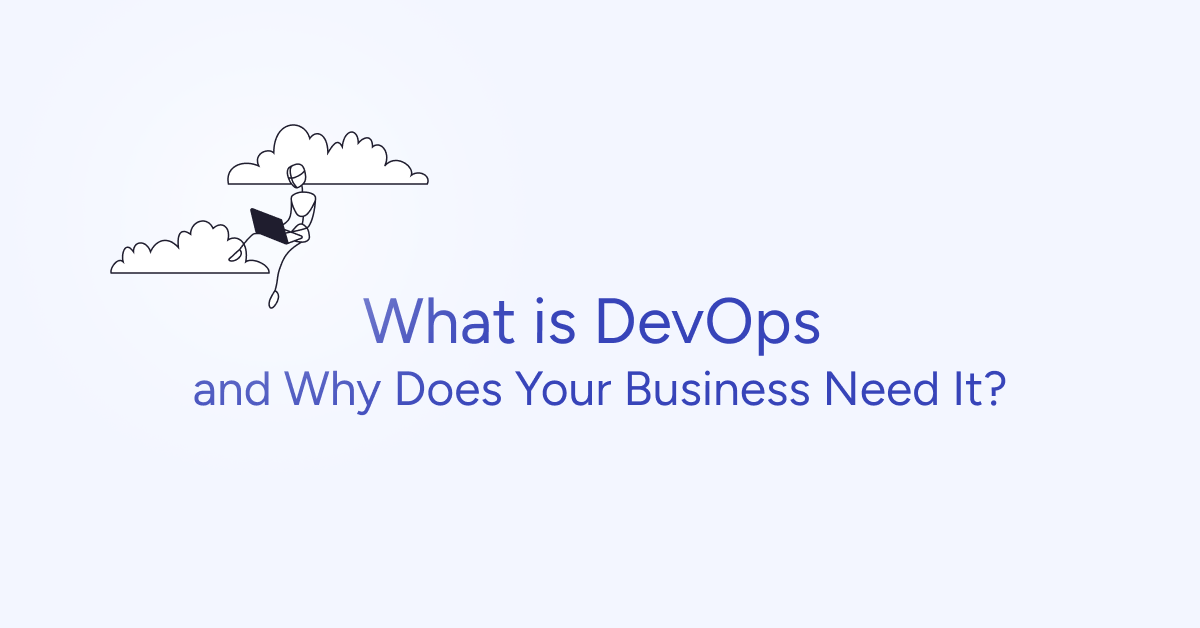The concept of DevOps has taken the tech world by storm. While some are drawn to the field for its attractive salaries, true success in DevOps requires more than just technical skills.
This article dives deeper than the hype. I’ve spent years implementing DevOps across various companies, drawing on my prior experience as a system administrator and IT director. Now, as CTO & Co-founder of Gart Solutions, I want to share my insights on what it truly means to be a DevOps professional.
Who embodies the DevOps spirit?
The question “what is DevOps?” sparked this article. There’s a misconception that DevOps is a specific job title, a collection of tools, or a separate developer department.
DevOps is a cultural shift, a way of working. It’s a set of practices that foster collaboration between developers and system administrators. DevOps doesn’t change core roles, but it blurs departmental lines and encourages teamwork. Its goals are clear:
- Frequent software updates
- Faster software development
- Streamlined and rapid deployment
There’s no single “DevOps tool.” While various tools come into play at different stages, they all serve a common purpose.

Having interviewed DevOps candidates for over 5 years, I’ve observed a crucial gap: those who view DevOps as a job title often face challenges collaborating with colleagues.
Here’s a real-life example: a candidate with an impressive resume came in. His short stints at previous startups (5-6 months each) raised concerns. He blamed his departures on unsuccessful ventures and a company where “nobody understood him.” Apparently, developers used Windows, and his role was to “package” their code in Docker for the CI/CD pipeline. He spoke negatively about his colleagues and workplace, suggesting a lack of problem-solving skills.
A key question I ask all candidates is:
“What does DevOps mean to YOU?”
I’m interested in their personal understanding. This particular candidate knew the textbook definition but disagreed, clinging to the misconception of DevOps as a job title. This misunderstanding is the root of his struggles, and it’s likely true for others with the same perspective.
Employers, drawn to the “magic” of DevOps, seek a silver bullet – a single person to create this magic. Applicants who view DevOps as a job title don’t grasp that this approach leads to disappointment. Some might have just added “DevOps” to their resume to ride the trend or for the higher salary, without truly understanding the philosophy.
DevOps Methodology: Putting Theory into Practice
DevOps methodology isn’t theoretical; it’s about practical application. As mentioned earlier, it’s a toolbox of practices and strategies used to achieve specific goals. These practices can vary significantly depending on a company’s unique business processes, but that doesn’t make one approach inherently better or worse. It’s all about finding the right fit.
DevOps Philosophy: Capturing the Essence
Defining DevOps philosophy can be tricky. There’s no single, universally accepted answer, likely because practitioners are so focused on getting things done that formalizing the philosophy takes a back seat. However, it’s a crucial aspect with deep ties to engineering practices.
Those who delve deeply into DevOps often develop a sense of “spirit” or a holistic understanding of how all company processes interconnect.
Drawing on my experience, I’ve attempted to formalize some core principles of this philosophy:
- DevOps is Integrated: It’s not a separate entity; it permeates all aspects of a company’s operations.
- Company-wide Adoption: For DevOps to be successful, all employees should consider its principles when planning their work.
- Streamlining Efficiency: DevOps aims to minimize the time spent on internal processes, ultimately accelerating service development and enhancing customer experience.
- Proactive Problem-Solving: In simpler terms, DevOps encourages a proactive approach from every employee to reduce time wasted and improve the quality of the IT products we use.
These “postulates,” as I call them, are a springboard for further discussion. They offer a starting point to grasp the core tenets of the DevOps philosophy.
The Heart of DevOps: Communication
Communication is the lifeblood of DevOps. Because it’s a cultural shift and a set of practices, strong communication skills are even more important than technical knowledge for a DevOps engineer.
There’s also a fascination with specific tools like Kubernetes. However, using a tool like Kubernetes everywhere, regardless of suitability, can be counterproductive. It’s crucial to choose the right tool for the job. While Kubernetes offers advantages, maintaining a cluster can be more expensive than a traditional deployment scheme.
DevOps implementation isn’t cheap; it needs to justify its cost through overall business benefits. DevOps engineers act as pioneers, introducing new methodologies and building processes within companies. Success hinges on continuous communication with employees at all levels – from entry-level team members to leadership. Everyone needs to understand the “why” behind DevOps practices for successful implementation.
DevOps engineers might also need to navigate resistance to change. For example, developers accustomed to managing their entire project infrastructure locally on powerful laptops may resist shifting to a more streamlined approach. This is where communication becomes crucial in explaining the benefits of new methods.
However, many teams readily embrace new tools and actively participate in the DevOps transformation. Regardless of the initial reception, clear communication between the DevOps engineer and the team is essential for a smooth transition.
DevOps: Not a One-Size-Fits-All Solution
DevOps isn’t a magic bullet for every company. It’s crucial to understand when it makes sense and when it doesn’t.
Generally, small businesses with static websites or information services that don’t directly drive customer satisfaction likely won’t see a significant benefit from DevOps.
Here’s a good rule of thumb: If a company’s success hinges on the quality, availability, and targeted features of its IT products used for customer interaction, then DevOps becomes a strong consideration.
Take a bank, for example. They rely heavily on IT infrastructure for customer interactions, making them a prime candidate for DevOps adoption.
Company Size Isn’t the Only Factor
Don’t assume that large companies automatically need DevOps. Consider an automaker whose primary customer interaction happens through dealerships via email and phone. Their internal operations may be well-managed with traditional system management approaches, negating the need for a full-blown DevOps implementation.
However, company size doesn’t always dictate the need for DevOps. Many small software companies thrive with the DevOps methodology because it allows them to compete effectively.
The Key Factor: IT Product Importance
The ultimate question is: how critical are your IT products to your company’s success and customer satisfaction?
If software is your primary revenue driver, regardless of other products or services, then DevOps is likely a worthwhile investment. Online stores and mobile game apps are perfect examples.
Our Expertise at Gart Solutions
At Gart Solutions, we understand the transformative power of DevOps for businesses of all sizes. Our team of passionate DevOps engineers fosters a culture of knowledge sharing through internal training and workshops.
Here’s a glimpse into our DevOps toolbox:
- CI/CD Pipeline Automation: We leverage industry-leading tools to streamline your software builds, testing, and deployments, ensuring speed and efficiency.
- Infrastructure Management: Our experts handle your infrastructure setup, maintenance, and optimization, allowing you to focus on core development activities.
- Containerization with Kubernetes: We provide expertise in deploying and managing containerized applications using Kubernetes, offering scalability and portability.
- Cloud Solutions: Our team helps you navigate the world of cloud computing, from migration strategies to ongoing cloud management, optimizing your cloud footprint and costs.
- Security & Monitoring: We prioritize robust security measures throughout your development lifecycle, while implementing comprehensive monitoring to ensure optimal application performance.
We constantly evaluate and integrate new tools and techniques to ensure our clients have access to the most cutting-edge solutions. Our goal is to be your trusted partner, empowering you to achieve your business objectives through the power of DevOps.
Watch our webinar about DevOps ROI & Value, by Fedir Kompaniiets, founder and CEO of Gart Solutions.
In Conclusion: The Power of Communication and Collaboration
The journey to becoming a top-tier DevOps engineer hinges on a core skill: effective communication. DevOps is not a solo act; it’s about fostering collaboration and breaking down silos. The most successful practitioners take the initiative to connect with colleagues, actively propose solutions, and embrace open discussions. Be prepared for ideas to evolve through team interaction – that’s the magic of DevOps!
See how we can help to overcome your challenges








